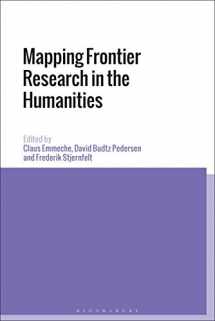
Mapping Frontier Research in the Humanities
ISBN-13:
9781350074705
ISBN-10:
1350074705
Edition:
Reprint
Author:
Frederik Stjernfelt, Claus Emmeche, David Budtz Pedersen
Publication date:
2018
Publisher:
Bloomsbury Academic
Format:
Paperback
256 pages
FREE US shipping
Book details
ISBN-13:
9781350074705
ISBN-10:
1350074705
Edition:
Reprint
Author:
Frederik Stjernfelt, Claus Emmeche, David Budtz Pedersen
Publication date:
2018
Publisher:
Bloomsbury Academic
Format:
Paperback
256 pages
Summary
Mapping Frontier Research in the Humanities (ISBN-13: 9781350074705 and ISBN-10: 1350074705), written by authors
Frederik Stjernfelt, Claus Emmeche, David Budtz Pedersen, was published by Bloomsbury Academic in 2018.
With an overall rating of 3.5 stars, it's a notable title among other
books. You can easily purchase or rent Mapping Frontier Research in the Humanities (Paperback) from BooksRun,
along with many other new and used
books
and textbooks.
And, if you're looking to sell your copy, our current buyback offer is $0.3.
Description
Knowledge production in academia today is burgeoning and increasingly interdisciplinary in nature. Research within the humanities is no exception: it is distributed across a variety of methodic styles of research and increasingly involves interactions with fields outside the narrow confines of the university. As a result, the notion of liberal arts and humanities within Western universities is undergoing profound transformations. In Mapping Frontier Research in the Humanities, the contributors explore this transformative process. What are the implications, both for the modes of research and for the organisation of the humanities and higher education?The volume explores the intra- and extra-academic engagement of humanities researchers, their styles of research, and exemplifies their interdisciplinary character. The humanities are shaping debates about culture and identity, but how? Has neuroscience changed the humanities? What do they tell us about 'hypes' and economic 'bubbles'? What is their international agenda? Drawing on a number of case studies from the humanities, the perceived divide between classical and 'post-academic' modes of research can be captured by a republican theory of the humanities. Avoiding simple mechanical metrics, the contributors suggest a heuristic appreciation of different types of impact and styles of research. From this perspective, a more composite picture of research on human culture, language and history emerges. It goes beyond “rational agentsâ€, and situates humanities research in more complex landscapes of collective identities, networks, and constraints that open for new forms of intellectual leadership in the 21st century.


We would LOVE it if you could help us and other readers by reviewing the book
Book review

Congratulations! We have received your book review.
{user}
{createdAt}
by {truncated_author}


